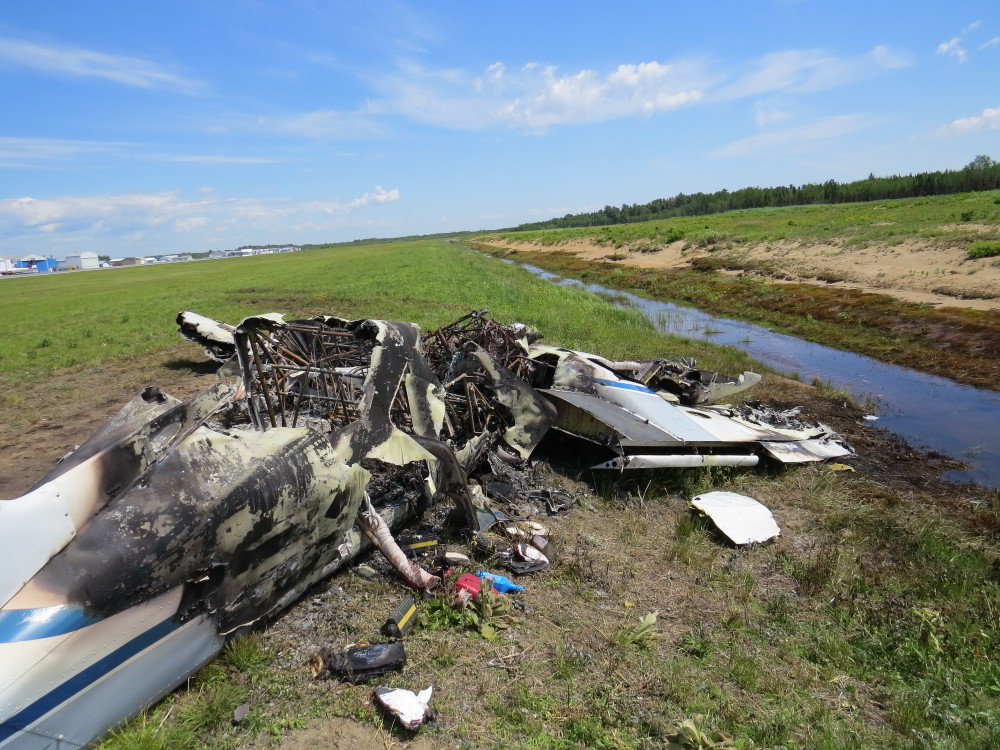Loss of control on takeoff and collision with ground
Cargair Ltd.
Piper PA-23-250 Aztec, C-GDUL
Trois-Rivières Airport, Quebec
The occurrence
On 17 June 2019, a Piper PA-23-250 (registration C-GDUL, serial number 27-3986), operated by Cargair Ltd., was conducting a night visual flight rules cross-country flight, departing from Montréal/St-Hubert Airport, Quebec, with an approach followed by a missed approach at Québec/Jean Lesage International Airport, Quebec, and Trois-Rivières Airport, Quebec. There was 1 pilot and 1 passenger, who was also a flight instructor, on board. On approach for the Trois-Rivières Airport, Quebec, a decision was made to conduct a touch-and-go. During the take-off roll, the propellers of both engines struck the surface of the runway. The aircraft took off, turned left, and then the pilot lost control of the aircraft. The aircraft collided with the ground 222 feet south of Runway 23 at 0009 Eastern Daylight Time on 18 June. No signal was detected from the emergency locator transmitter. The aircraft was destroyed by a post-impact fire. The 2 occupants were able to evacuate the aircraft. One received minor injuries, and the other received serious injuries.
Media materials
News release
Loss of control on takeoff and collision with ground in Trois-Rivières, Quebec
Read the news release
Deployment notice
TSB deploys a team of investigators following a small aircraft accident in Trois-Rivières, Quebec
The Transportation Safety Board of Canada (TSB) is deploying a team of investigators to Trois-Rivières, Quebec, following a runway excursion accident involving a Piper PA-23 aircraft. The TSB will gather information and assess the occurrence.
Investigation information
A19Q0091
Loss of control on takeoff and collision with ground
Cargair Ltd.
Piper PA-23-250 Aztec, C-GDUL
Trois-Rivières Airport, Quebec
Download high-resolution photos from the TSB Flickr page.
Class of investigation
This is a class 3 investigation. These investigations analyze a small number of safety issues, and may result in recommendations. Class 3 investigations are generally completed within 450 days. For more information, see the Policy on Occurrence Classification.
TSB investigation process
There are 3 phases to a TSB investigation
- Field phase: a team of investigators examines the occurrence site and wreckage, interviews witnesses and collects pertinent information.
- Examination and analysis phase: the TSB reviews pertinent records, tests components of the wreckage in the lab, determines the sequence of events and identifies safety deficiencies. When safety deficiencies are suspected or confirmed, the TSB advises the appropriate authority without waiting until publication of the final report.
- Report phase: a confidential draft report is approved by the Board and sent to persons and corporations who are directly concerned by the report. They then have the opportunity to dispute or correct information they believe to be incorrect. The Board considers all representations before approving the final report, which is subsequently released to the public.
For more information, see our Investigation process page.
The TSB is an independent agency that investigates air, marine, pipeline, and rail transportation occurrences. Its sole aim is the advancement of transportation safety. It is not the function of the Board to assign fault or determine civil or criminal liability.
